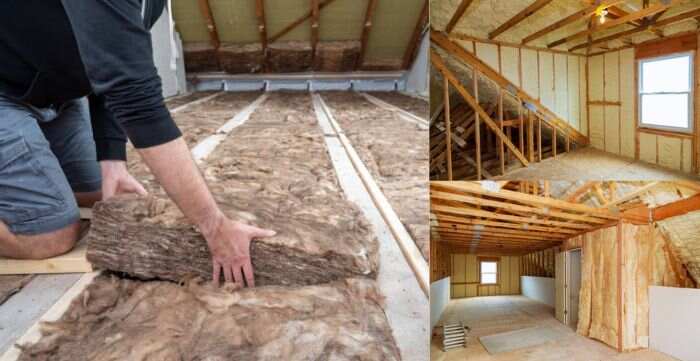
When it comes to creating a safe and comfortable living environment, choosing the right insulation for your home is crucial. The insulation you select can significantly impact your residence’s energy efficiency, indoor air quality, and overall safety. In this article, we will explore some of the safest insulation types available today and delve into their unique properties, benefits, and attic insulation installation considerations.
#1. Fiberglass Insulation.
One of the most common and widely used options in residential properties is fiberglass insulation. It is composed of thin glass fibers and offers excellent thermal resistance and sound absorption. Fiberglass insulation is non-combustible, making it a safe choice for homeowners concerned about fire hazards. It is also resistant to mold, moisture, and pests, ensuring a healthy living environment.
#2. Cellulose Insulation
Another popular and safe insulation type is cellulose. They are made from recycled paper products that are treated with fire-retardant chemicals; cellulose insulation provides exceptional thermal performance. It is an eco-friendly option, as it reduces landfill waste and promotes sustainability. Cellulose insulation is known for its excellent resistance to mold and pests, making it an ideal choice for those prioritizing a healthy home environment.
#3. Mineral Wool Insulation
The third on our list for the safest insulation type is mineral wool insulation, a versatile and safe insulation material. It is made by spinning molten rock or slag into fibers, which are formed into batts or blown-in insulation. Mineral wool offers excellent thermal and sound insulation properties while resisting fire, mold, and pests. It also does not release toxic gases when exposed to high temperatures, making it a reliable choice for home safety.
#4. Natural Fiber Insulation
For homeowners seeking a more eco-friendly option, natural fiber insulation is worth considering. Materials like cotton, sheep’s wool, and hemp create these insulation types. Natural fiber insulation is biodegradable, renewable, and free from harmful chemicals. It has excellent thermal performance and is safe to handle without protective equipment. However, it is essential to ensure proper installation and maintenance to prevent moisture-related issues.
#5. Spray Foam Insulation
One of the most effective and safe options available on the market is spray foam. It is composed of foam that expands after application, creating a seamless barrier that prevents air and moisture from entering the home. Spray foam is non-toxic and non-flammable, making it an ideal choice for high-risk areas. It is also more energy efficient than other insulation types and can help reduce heating and cooling bills.
Installing the Insulation
No matter what type of insulation you choose, it is crucial to ensure that it is correctly installed. Poorly installed insulation can lead to various issues, including energy inefficiency, moisture accumulation, air infiltration, and even structural damage. For this reason, hire an experienced contractor, such as iFOAM in Layton, who will take the necessary steps to guarantee a safe and secure installation.
Hiring a professional contractor with expertise in home insulation can help ensure that the materials are correctly installed, minimizing the risk of potential hazards. Also, ensure that the contractor uses approved materials and follows all safety standards. Taking these precautions can help you create a safe and comfortable living environment in your home.
Conclusion
In conclusion, selecting the safest insulation for your home is paramount for creating a comfortable, energy-efficient, and healthy living space. Fiberglass, cellulose, mineral wool, spray foam, and natural fiber insulation are all excellent options, each with unique properties and benefits. By carefully considering factors such as fire resistance, moisture control, and environmental impact, you can make an informed decision that aligns with your needs and priorities. Remember, professional installation and adherence to guidelines are crucial to maximizing the safety and effectiveness of your home insulation!
Leave a Reply